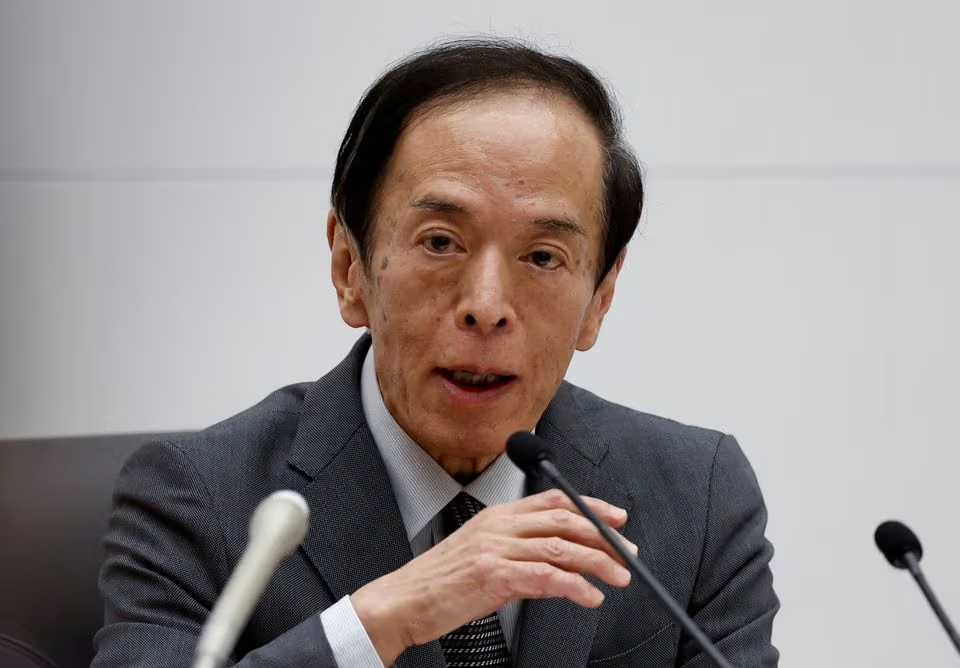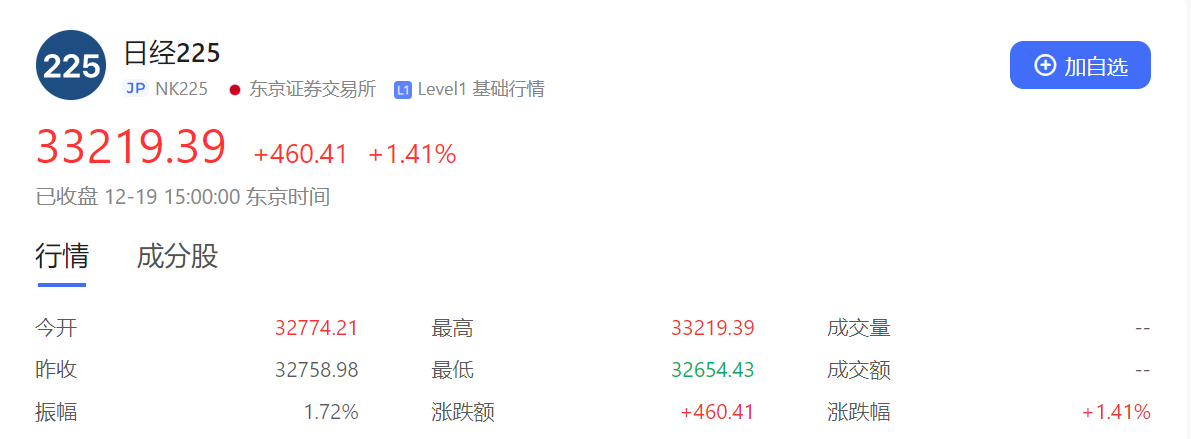Hold still! Bank of Japan maintains ultra-loose monetary policy Nikkei rises in response
On December 19, the Bank of Japan announced that it would maintain ultra-loose monetary policy, in line with market expectations.。Nikkei 225 up 1.41% to close at 33,219.39 points。
On December 19, the Bank of Japan announced that it would maintain ultra-loose monetary policy, in line with market expectations.。
The Bank of Japan kept its short-term interest rate target at -0 at a two-day meeting that ended Tuesday.1%, keeping the 10-year government bond yield target at around 0%。Meanwhile, the Bank of Japan also maintained a 10-year Treasury yield of 1.0% easing cap unchanged。
After keeping the easing policy unchanged, Bank of Japan Governor Kazuo Ueda said that while prices and wages appear to be moving in the right direction, there is still uncertainty about the situation。
For nearly a year, Japan's inflation rate has remained above 2%。Some companies have previously said they are prepared to continue raising wages, which has led to increased speculation about the Bank of Japan's policy shift in the recent market.。
In a statement, the Bank of Japan reiterated its commitment to take "additional easing measures if necessary," adding that uncertainty in the economy was "extremely high."。
Kazuo Ueda said at a press conference: "The likelihood of trend inflation accelerating closer to our price target is gradually increasing.。But we still need to watch carefully for a positive wage inflation cycle.。"

In July, the Bank of Japan raised the ceiling on 10-year bond yields, easing controls on long-term borrowing costs.。In October, the cap was lowered to an easing level, suggesting that Ueda and Nao are steadily repealing their predecessor's aggressive stimulus measures.。
Last month, a survey of economists showed that more than 80% of economists expected the Bank of Japan to end its negative interest rate policy next year, with half predicting April as the most likely time。There are also some economists who believe that there may be a shift in policy in January next year.。
Analysts said the BoJ may find it easier to act in months such as January and April, when it releases its quarterly outlook report containing new growth and price forecasts.。
However, the sharply changing global monetary policy environment may make the Bank of Japan's decision more unpredictable.。Currently, the Federal Reserve and the European Central Bank have sent signals that they will not raise interest rates.。
Capital.Kyle Rodda, senior financial markets analyst at com, said: "Given that the market is preparing for next year's rate cut cycle in the United States and Europe, the Bank of Japan is wise to wait for things to end and assess global fundamentals.。"
Some analysts said the Bank of Japan could trigger a surge in the yen if it raises rates at a time when other central banks are cutting rates, which would hurt profits at big manufacturers and prevent them from raising wages.。
Rodda said the yen is likely to continue to follow changes in U.S. yields in the Fed's policy outlook, while the Nikkei will react to the exchange rate.。
Today (December 19), by the central bank to maintain ultra-loose policy news, the yen against the dollar once dipped to 143.78, while the Nikkei 225 rose 1.41% to close at 33,219.39 points。

Benchmark 10-year Japanese government bond yields also fell about 4 percent to zero..642。Meanwhile, ultra-long-term bond yields have all declined。The yield on the 30-year Treasury note fell 5 basis points to 1..555%, the lowest level since August 10。The yield on the 40-year Treasury note fell 7 basis points to 1..765%。
Kentaro Hatono, fund manager at Asset Management One, said: "As markets focus on the timing of the Bank of Japan's exit from negative interest rate policy, ultra-long-term Japanese government bonds tend to outperform those with maturities of less than 10 years.。"
Hatono added that the sharp drop in yields was also related to the light market, with most foreign investors having recently withdrawn.。
Japanese government bond yields have been volatile this month, with 10-year yields fluctuating as much as 18 basis points, partly on speculation that the Bank of Japan may soon end its negative interest rate policy.。
Katsutoshi Inadome, senior strategist at Sumitomo Mitsui Trust Asset Management, said the decline in bond yields will be short-lived and the market will continue to fluctuate as the Bank of Japan holds a large portion of Japanese government bonds, resulting in poor liquidity.。
On the other hand, Japanese government bond futures rose。Inadome said; "The rise in futures suggests that yields on cash bonds may fall later in the day as some investors shorting cash bonds look to buy them back.。"
·Original
Disclaimer: The views in this article are from the original Creator and do not represent the views or position of Hawk Insight. The content of the article is for reference, communication and learning only, and does not constitute investment advice. If it involves copyright issues, please contact us for deletion.